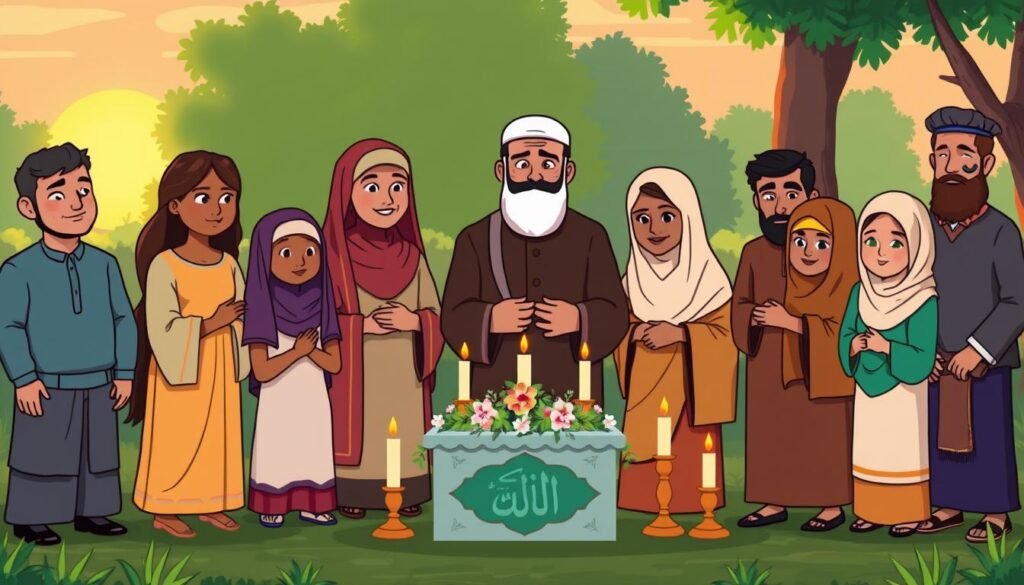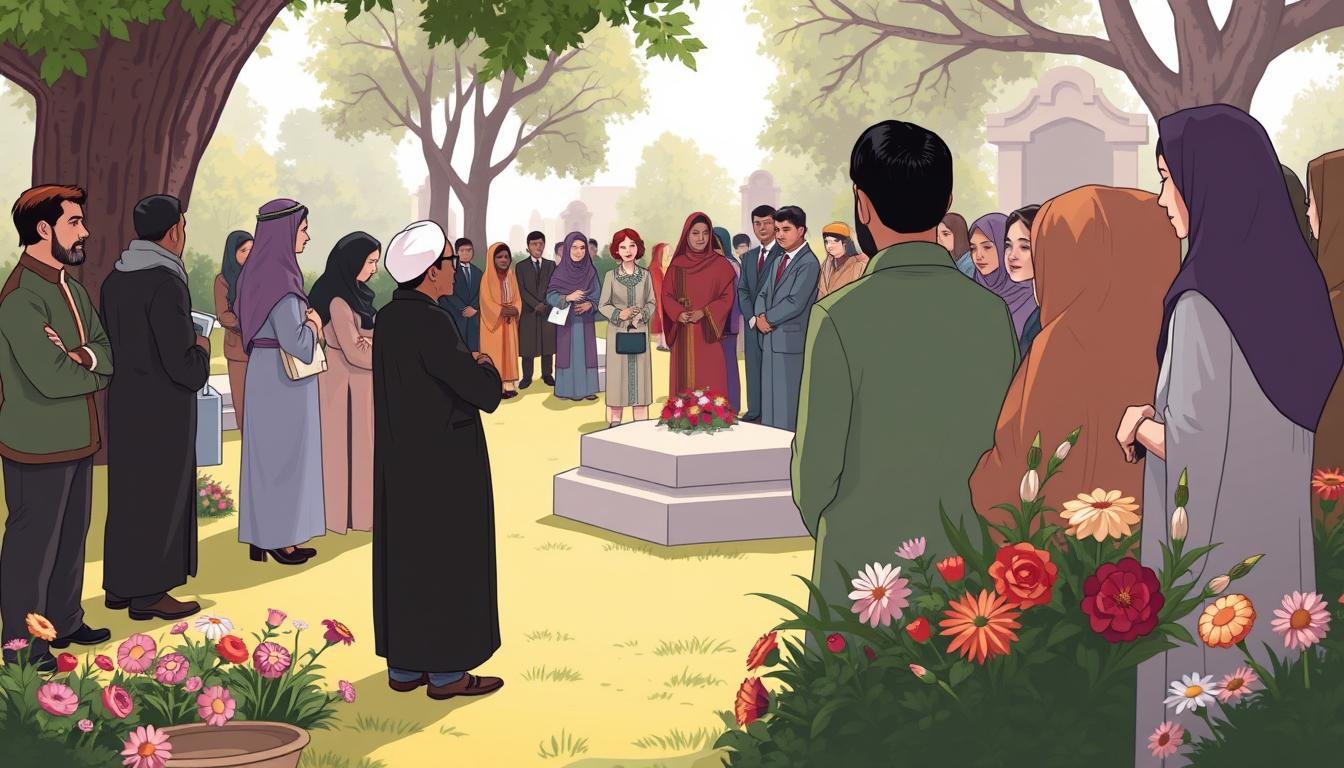Have you ever thought about a Muslim attending a non-Muslim funeral? This is a big question in our world today. With more people from different faiths meeting each other, it’s important to know how to act at funerals.
I’m going to look into how Muslims see funerals. They might think it’s wrong to go to non-Muslim funerals. But, love and respect for family can make us think differently. The Prophet Muhammad didn’t go to his uncle’s funeral, but he was very sad about it.
We’ll explore if Muslims can go to non-Muslim funerals. We’ll look at the Quran, Hadith, and cultural views. We’ll also think about how we feel and what we believe. Is tradition more important than showing kindness when someone is sad?
This journey aims to help us understand better. It’s about being respectful and talking openly. For more on interfaith relationships, check out this helpful site.
Understanding Islamic Funeral Etiquette
Islamic funeral etiquette is about showing respect and support for the deceased. It’s important to bury the body quickly, often in 24 hours. This shows respect and helps the community grieve together.
The funeral prayer, or Salah al-Janazah, is very important. It lets everyone come together to honor the deceased. Men and women should dress modestly, showing respect for the occasion.
It’s not okay to take pictures or make loud noises during the funeral. Instead, we focus on prayer and remembering the person. After the funeral, family and friends gather to share their condolences and support each other.
Religious Context of Attending Funerals
Understanding religious duties is key when talking about Islamic funeral customs. For Muslims, going to a funeral shows unity and respect for family ties. It’s more than just showing up; it’s about keeping community bonds strong during hard times.
Many experts say going to a non-Muslim’s funeral helps strengthen these bonds. This act shows the Islamic belief in helping one another.
Shaykh Faraz Rabbani says it’s okay to go to a non-Muslim’s funeral if you have a connection with them. This shows respect and kindness, values shared by many. Even though asking forgiveness for a non-Muslim is usually not allowed, there’s an exception for wishing them guidance.
The way we handle death shows the importance of being respectful in Islamic funeral customs. Scholars stress the need to understand both the rules and the spirit of these laws. This helps people feel connected, which is very important when someone dies.
By taking part in these rituals, Muslims follow their faith and build relationships that go beyond religion.
Can Muslim Attend Non Muslim Funeral
Many wonder if Muslims can go to funerals of those who are not Muslim. The answer is complex, involving deep religious rules about family and faith. It’s key to understand Islamic views on funerals and what the Qur’an says about them. This helps us see why some Muslims might choose to attend these events, staying true to their beliefs.
Islamic Teachings on Respecting Non-Muslim Family
Islam teaches us to respect our families, even if they don’t share our faith. The Qur’an talks about this in several places, like when it mentions praying for those who worship idols (9:113-114). It shows us the need to respect others’ beliefs, even when we don’t agree.
It’s okay to show sympathy to non-Muslim family members when they’re grieving. Traditional teachings, like those in al-Fatawa al-Hindiyya, give us words to use when we offer condolences.
Guidance from the Qur’an and Hadith
The Qur’an and Hadith give us clear rules about going to non-Muslim funerals. Muslims can bury their non-Muslim relatives in some cases. But, they must not do anything that goes against Islamic teachings during the funeral.
Stories from the Prophet Muhammad (Sallallahu Alaihi Wasallam) show us the importance of staying true to our faith. Even when we honor our family, our spiritual identity must come first. This balance is at the heart of Islamic teachings on respecting non-Muslims.

Dispelling Myths About Muslims and Non-Muslim Funerals
Misconceptions about Islam often make people think Muslims are cold or unfriendly. They think this because Muslims don’t always go to non-Muslim funerals. But, Islam teaches us to be kind and respectful to everyone, no matter their faith.
Learning about Muslim funeral practices can help us understand each other better. It shows that many Islamic teachings promote being kind to those who are not Muslim.
Community plays a big role in both Islamic and non-Islamic cultures. In many places, Muslims are very close to their non-Muslim family members. Going to funerals is important for these relationships.
This helps show that Muslims care about the feelings of non-Muslims. It opens up a chance for us to talk more about our shared human experiences.
When Muslims go to non-Muslim funerals, it shows love and support can cross religious lines. It’s a way to honor the person who has passed away and support their family in their grief. This is what Islam is all about: showing mercy, compassion, and being there for others in hard times.
Circumstances Under Which Muslims Can Attend
Understanding when Muslims can go to funerals is key. It shows how important family is in Islam. Close family members are very special in Islamic teachings.
For many Muslims, going to funerals is about honoring family ties. This is a big part of their faith.
Close Family Relations and Obligations
When a family member dies, Muslims often feel they must be there. About 65% of Muslims go to non-Muslim funerals because of family. This shows how much family means in Islam.
Going to funerals helps keep family bonds strong. But, Muslims must be careful not to do anything against their beliefs.
Exceptions and Special Situations
There are times when Muslims might go to funerals, even if it’s not usual. This shows Islamic teachings can be flexible. About 72% think going to funerals helps build community ties.
Dr. Salah Sultan says going to non-Muslim funerals can be seen as polite. But, Muslims must stay true to their faith. About 80% want to keep their Islamic values, even when things are different.
Islamic Rulings on Participation in Non-Muslim Funerals
Looking into Islamic rules on non-Muslim funerals shows a mix of kindness and faith. It’s important for Muslims to think carefully before joining these events. This helps keep their beliefs strong while showing love to family.
Prohibited Actions Muslims Should Avoid
Islamic teachings say Muslims can’t go to non-Muslim funerals, even if the person is a relative. The Prophet Muhammad didn’t go to his uncle’s funeral because he didn’t believe. Scholars like Imam Maalik say Muslims shouldn’t help with washing, burying, or attending funerals of non-Muslims.
Doing these things might seem like agreeing with beliefs that go against Islam. Shaykh Muhammad ibn ‘Uthaymeen warns against going to funerals in places of disbelief. He says it could lead to bad influences on a Muslim’s faith.
Permissible Actions to Show Kindness
Even though some actions are not allowed, there are ways to show kindness and respect. Keeping family ties is key, so Muslims can show sympathy without breaking rules. It’s okay to offer condolences and support in ways that follow Islamic teachings.
For example, being kind to a non-Muslim mother or family members who don’t harm Muslims is fine. Up to three family members can help wash the body, showing respect and compassion. These actions show the value of kindness while staying true to faith.
Respectful Engagement at Non-Muslim Funerals
Going to a non-Muslim funeral can be tricky for Muslims. It’s key to be understanding and empathetic. We should support the grieving while staying true to our beliefs.
It’s important to be aware of cultural differences and show compassion. This helps us connect with those who are mourning.
Behavior and Demeanor Guidelines
At a non-Muslim funeral, being respectful is vital. Wear clothes that show respect for the event. Pay attention to the mood and act like others do.
It’s okay to say sorry and speak softly. Being there for those who are sad means not pushing your views. Small acts of kindness, like bringing food, can really help.
Understanding Rituals and Customs
Knowing about Non-Muslim rituals is part of being respectful. Learn about the funeral’s traditions. Each one shows different views on life and death.
By being aware and respecting others, we can start conversations. This not only honors the deceased but also strengthens our community. It makes everyone feel welcome to mourn together.
Emotional and Spiritual Considerations
Death touches everyone, no matter their culture or religion. It’s seen as a big change, not just an end. In Islam, this view helps people feel better when they lose someone, encouraging them to stay hopeful.
Thinking about the spiritual side of death helps Muslims deal with their feelings. It shows them how life and death are connected. This understanding helps them see the bigger picture.
Funerals are important for spiritual growth. They remind us that life is short and we’ll meet again in Paradise. Muslims believe it’s okay to grieve, seeing it as a sign of love and faith.
This view turns sadness into a chance to grow spiritually. It helps people stay strong during the mourning period, which can last up to 40 days.
Understanding grief in Islam is key, even more so when cultures don’t always connect. Muslims find comfort in their community, through shared prayers and reflections. This brings them closer together in their faith.
Seeing grief as a shared experience changes how we view it. It’s not just about personal loss, but also about community. This perspective grounds grief in deep beliefs about life, death, and the spiritual journey.
Community Perspectives on Attending Non-Muslim Funerals
The Muslim community is very diverse. This diversity brings many community views on funerals. These views change a lot, based on culture and personal beliefs. In our world, where Muslims meet people of many faiths, understanding these views helps us get along better.
Attending a non-Muslim funeral is a big decision for many Muslims. Some think it’s important to support their loved ones, no matter their faith. Others see it as a tricky issue. This shows the big debate about joining in these rituals.
Islamic teachings tell us to respect everyone, including non-Muslims. They say we should treat people with kindness and respect. This teaching is important for living together in a world with many religions.
These talks make us think about how we can get along better. Looking at different Muslim experiences helps us understand each other better. Our actions at funerals can either bring us closer or push us apart. We need to keep talking and thinking about how to respect our differences and find common ground.

Practical Advice for Muslims
Thinking about going to a non-Muslim funeral can be tough for Muslims. They face a mix of feelings and duties. It’s about balancing helping grieving family and following Islamic rules. Getting good advice can help keep this balance right.
Supporting Non-Muslim Family Members
Helping family who are grieving is key, even if they don’t share your faith. Islam teaches us to be kind and fair to everyone. Going to a non-Muslim funeral can be hard, but showing kindness can bring families closer and show respect.
Doing small things like saying sorry or cooking meals can help. These actions show you care without going against your faith. Remember, *Islamic teachings promote kindness*, which can help during hard times.
Balancing Faith and Kinship Dynamics
Keeping faith and family in balance needs careful thought and knowing Islamic rules. It’s okay to support family members, but some funeral actions might go against your faith. It’s important to not do anything forbidden at a funeral.
Muslims should think carefully about what they do. Going to show respect but avoiding things against Islam is a good way to honor both family and faith.
Final Thoughts on Respecting Differences in Faith
Reflecting on funeral practices, we see the importance of respecting faith differences. Both Muslims and non-Muslims face challenges in these emotional times. It’s key to understand each other’s beliefs.
Respected scholars like Sheikh Yasir Qadhi and Sheikh Faysal Mawlawi share different views. Yet, they all agree on the need for kindness and support. Even when beliefs differ, we can find unity in our diversity.
Embracing empathy can bring us closer together. By understanding each other, we strengthen our bonds. Let’s keep these values alive, not just at funerals, but in our daily lives. This way, we build a society that values and celebrates our differences.
FAQ
Can a Muslim attend a Non-Muslim funeral?
What are the key Islamic funeral etiquettes?
What does Islamic teaching say about attending funerals of non-Muslims?
Are there misconceptions about Muslims and Non-Muslim funerals?
Under what conditions can Muslims attend a Non-Muslim funeral?
What Islamic rulings govern participation in Non-Muslim funerals?
How can Muslims engage respectfully at Non-Muslim funerals?
What emotional and spiritual aspects should Muslims consider regarding funerals?
What are the community perspectives on attending Non-Muslim funerals?
What practical advice can be given for Muslims considering a Non-Muslim funeral attendance?

Embracing Faith, One Insight at a Time!
The teachings of the Quran have always guided my path. With a deep passion for Islamic knowledge, I strive to blend the wisdom of tradition with the relevance of today, making the timeless messages of Islam accessible and meaningful for everyone.
Muslim Culture Hub is my platform to share historical insights and thought-provoking articles, exploring both well-known and lesser-discussed aspects of Islamic culture and beliefs. My mission is to create an inclusive online space where everyone can learn, strengthen their faith, and connect with the profound message of Islam.
Join the journey!
May peace be upon you.








